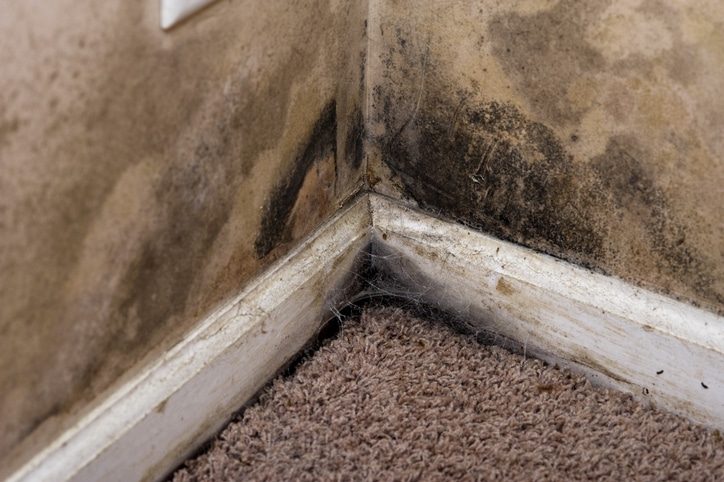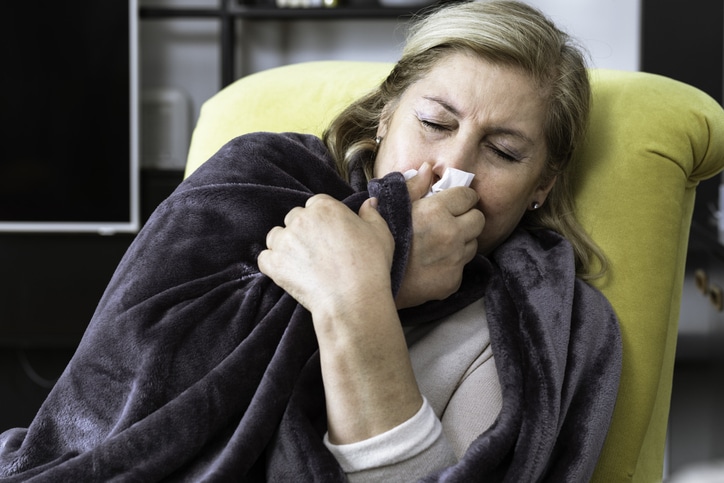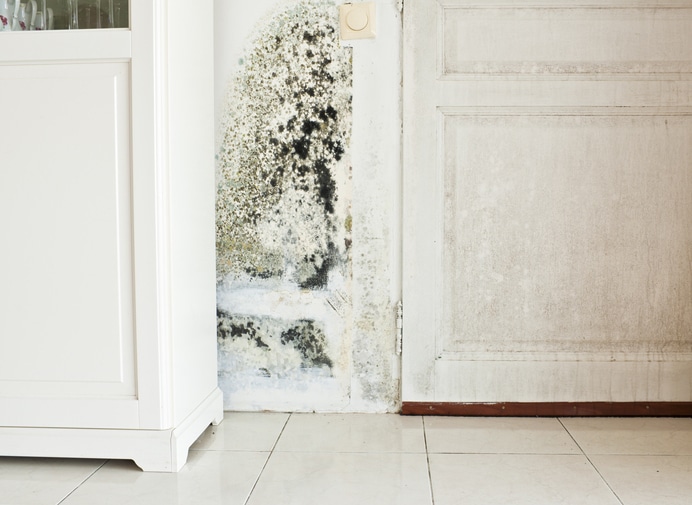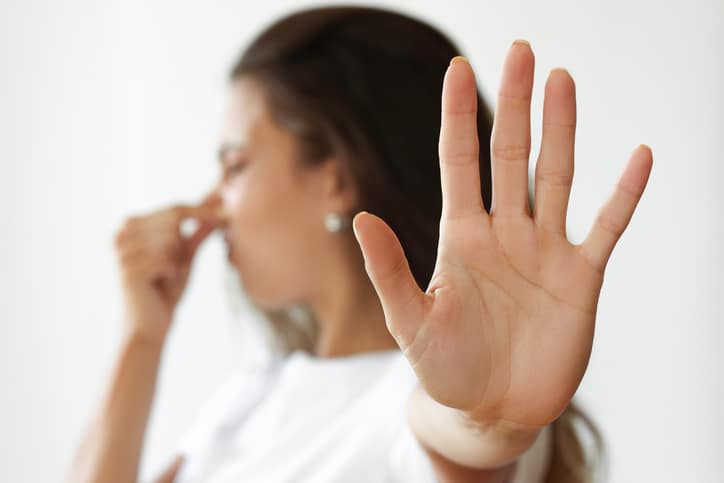With Lynchburg’s humid climate, mold issues can arise, posing health risks and property damage. That’s where Omega Disaster Restoration steps in. Our team of certified mold remediation specialists is dedicated to safeguarding your home or business from mold infestations, ensuring a safe and healthy indoor environment for you and your loved ones through our hero mold removal services.
Whether you’re dealing with a small patch or widespread mold growth, trust us to provide comprehensive solutions tailored to your needs. From thorough mold inspection to effective removal and prevention strategies, we’re committed to restoring your property and peace of mind. Our mold removal services include mold testing and inspection, offering a full-service approach to address all your mold-related concerns. Act swiftly to address mold issues and preserve the comfort of your Lynchburg home.
What is Mold Remediation?
Mold remediation is the process of identifying, cleaning, and removing mold from various environments to ensure a safe and healthy indoor environment. A crucial part of this process is mold assessment, which involves professional qualifications and services to accurately identify and address mold issues. Mold can be found in residential and commercial settings, including HVAC systems, and requires prompt attention to protect both health and property. At Omega Disaster Restoration in Lynchburg, we specialize in comprehensive mold remediation services, adhering to Environmental Protection Agency (EPA) guidelines to guarantee thorough cleanup and enhanced indoor air quality.
Causes of Mold Growth
Mold growth is a prevalent issue in both residential and commercial buildings, especially in areas with high humidity and moisture. Understanding the causes of mold growth is crucial for effective prevention and remediation. Here are some common factors that contribute to mold growth:
- Excessive Moisture: Mold thrives in environments with high moisture levels, such as bathrooms, kitchens, and basements. Leaky pipes, standing water, and damp surfaces provide the perfect breeding ground for mold spores.
- Poor Ventilation: Inadequate ventilation can lead to a buildup of moisture, creating an ideal environment for mold growth. Ensuring proper airflow in areas like attics, crawlspaces, and bathrooms can help mitigate this risk.
- Water Damage: Leaks, floods, and other forms of water damage can create conditions conducive to mold growth. Promptly addressing water damage and thoroughly drying affected areas is essential to prevent mold infestation.
- High Humidity: Areas with high humidity, such as crawlspaces and attics, are more prone to mold growth. Using dehumidifiers and maintaining indoor humidity levels below 60% can help control mold proliferation.
- Poor Maintenance: Failure to regularly inspect and maintain buildings can lead to unnoticed mold growth. Regular maintenance checks can identify potential problem areas and address them before mold becomes a significant issue.
By understanding these causes, property owners in Lynchburg can take proactive steps to prevent mold growth and protect their buildings from potential damage.
What are the Steps Involved in Mold Remediation?
Our mold remediation process at Omega Disaster Restoration follows a meticulous approach:
What is Omega Disaster Restoration?
Omega Disaster Restoration is a leading mold remediation company serving Lynchburg and the surrounding areas. With a team of certified specialists, we are dedicated to providing comprehensive mold remediation solutions tailored to the unique needs of each client.

What Services Does Omega Disaster Restoration Offer?
At Omega Disaster Restoration, we offer a range of services to address mold issues, including:
- Mold inspection and testing
- Safe and effective mold removal
- Advanced cleaning methods to improve indoor air quality
- Prevention strategies to avoid future mold growth
- Restoration certification to assure a mold-free environment
The Different Types of Mold Growth To Look Out For
The table below provides an overview of common mold types, detailing their unique characteristics, appearance, health risks, and recommended precautions for safe remediation.
Type of Mold | Characteristics | Appearance | Health Risks | Precautions |
Black Mold (Stachybotrys Chartarum) | Produces mycotoxins, potentially harmful | Slimy, greenish-black; found in damp, humid areas | Respiratory problems, allergic reactions | Wear protective gear; follow EPA mold removal guidelines |
Alternaria Mold | Common in damp environments, allergenic | Dark green or brown spots; found on plants and damp surfaces | Allergic reactions, particularly in sensitive individuals | Handle with care to prevent allergic reactions |
White Mold | Often mistaken for mildew, found in enclosed or humid spaces | Fuzzy, white growth | Respiratory issues, allergic reactions in sensitive individuals | Follow proper remediation techniques; use safety measures to prevent further growth |
The Impact of Mold in Lynchburg

Health Implications and Allergic Responses
Mold poses significant health risks beyond being just a visual nuisance, especially in Lynchburg’s climate. Exposure to mold spores can lead to various health problems, including allergic reactions characterized by sneezing, coughing, and eye irritation. These reactions are particularly severe for individuals with pre-existing respiratory conditions. In rare cases, mold exposure has even been linked to serious health conditions, highlighting the urgent need for immediate mold remediation in Lynchburg homes and businesses.

Property Damage
Mold can wreak havoc on properties in Lynchburg, causing extensive damage to structural integrity and aesthetics. Porous materials like drywall provide ideal breeding grounds for mold, leading to surface degradation over time. Moreover, mold can compromise HVAC systems, impacting their efficiency and indoor air quality. Swift intervention is crucial to preserve property value and maintain healthy indoor environments in Lynchburg’s diverse neighborhoods.

Musty Odors: A Key Indicator
The presence of a musty odor is a telltale sign of mold issues in Lynchburg properties, often associated with the metabolic processes of molds like black mold. This odor should serve as a clear call to action, as ignoring it can result in escalated infestations and increased remediation costs. Residents of Lynchburg should remain vigilant for these unmistakable signs of mold growth and act promptly to address them to protect their properties and health.
Importance of Mold Testing
Mold testing is a critical step in identifying and addressing mold growth in residential and commercial buildings. Here are several reasons why mold testing is essential:
- Identifies Mold Presence: Mold testing can detect the presence of mold, even if it’s not visible to the naked eye. This is particularly important in hidden areas like behind walls or under flooring, where mold can thrive unnoticed.
- Determines Mold Type: Different types of mold require different remediation approaches. Mold testing can identify the specific type of mold present, allowing for targeted and effective treatment.
- Assesses Mold Severity: Mold testing can assess the severity of mold growth, which is crucial for determining the extent of remediation required. This helps in planning the appropriate remediation process and resources needed.
- Prevents Health Risks: Mold exposure can pose serious health risks, including respiratory issues and allergic reactions. Early detection through mold testing can help prevent these health hazards by addressing mold growth before it escalates.
For residents and business owners in Lynchburg, mold testing is a proactive measure to ensure a safe and healthy indoor environment. By identifying and addressing mold issues early, you can prevent extensive property damage and protect the health of occupants.
The Diversity of Mold
Mold comes in various forms in Lynchburg, each with its own potential health impacts. Proper identification is crucial for effective remediation. Understanding the different types of mold, including black mold (Stachybotrys Chartarum), allergenic molds like Alternaria, and white mold, aids in adopting the appropriate removal approach. Lynchburg residents should seek expert consultation and take prompt action to address mold issues comprehensively and ensure safe and healthy living environments.
Recognizing the signs of mold early is crucial for prompt remediation. Common signs of mold in a property include:
- Visible mold growth on surfaces such as walls, ceilings, or floors
- Musty odors, indicating the presence of mold
- Water damage or moisture issues
- Allergic reactions such as sneezing, coughing, or eye irritation
What are the Health Risks Associated with Mold Exposure?
Exposure to mold can pose significant health risks, including:
- Allergic reactions such as sneezing, coughing, and eye irritation
- Respiratory issues, particularly for individuals with pre-existing conditions
- Serious health conditions in rare instances
Prompt mold remediation is essential to mitigate these health hazards and ensure a safe and healthy indoor environment for occupants. Contact Omega Disaster Restoration in Lynchburg for comprehensive mold remediation services tailored to your needs.
Preventing Future Mold Growth
Preventing future mold growth requires a combination of regular maintenance, good ventilation, and moisture control. Here are some practical tips to help keep mold at bay:
- Regularly Inspect Buildings: Conduct regular inspections to identify areas prone to mold growth. Look for signs of water damage, leaks, and high humidity levels, and address these issues promptly.
- Improve Ventilation: Ensure proper ventilation in areas like bathrooms, kitchens, attics, and crawlspaces. Good airflow helps reduce moisture levels and prevents mold spores from settling and growing.
- Control Moisture: Fix leaks immediately, use dehumidifiers in high-humidity areas, and ensure proper drainage around the property. Controlling moisture is key to preventing mold growth.
Use Mold-Resistant Materials: When renovating or building, consider using mold-resistant materials such as mold-resistant paint, drywall, and caulk. These materials can help prevent mold from taking hold.
Mold Remediation FAQs
Here are some frequently asked questions about our mold remediation services:
